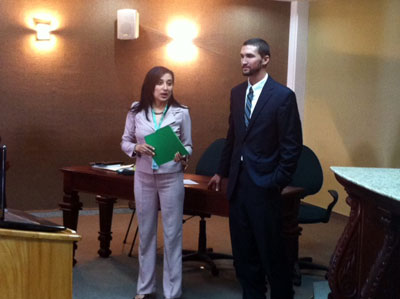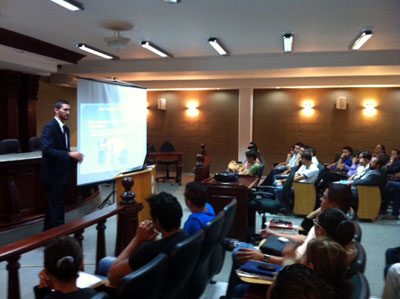

We enrolled our children in local preschools ($12 a month! Sweet!), and today was their first day. Sarah said they both were happy to get started with school. Sarah is doing well and excited to be here.
The work my supervising attorney has me doing is mostly appeals work. We are working towards getting inmates off death row. To put this work in context, up until 2002 people convicted of murder in Belize were automatically sentenced to death. Many of these people would have received a sentence of life in prison, but it wasn’t an option. Many of these inmates (convicted previous to 2002) are still on death row, but will never be executed. We are filing motions to release them from death row and get them re-sentenced.
As far as innocence project work: my supervising attorney is a member of a human rights group here in Belize. They handle most of the pro bono legal work that needs to be done. Since there is no law school in Belize, I think I should make a presentation to this group about innocence work and help them take steps towards doing this type of work.
Trip to Tegucigalpa, Honduras
October 30, 2012
You know your Spanish is rusty when you arrive in Honduras, your host picks you up, and instead of saying “I’m embarrassed that my Spanish isn’t as good as it used to be” you say, “I’m pregnant that my Spanish isn’t as good as it used to be.” Thankfully, that did not happen to me. But my Spanish was pretty rusty.

I have been in Dangriga, Belize for the last two months working with a human rights attorney. Though the human rights projects keep me busy I have the goal of educating as much of the legal community in Central America about innocence work as I can. While here, I want to encourage people in the legal profession to start innocence projects in their communities and help free inmates who have been wrongfully convicted. In order to do this in Honduras, my approach was to get in touch with a major university with a law program and make a presentation in front of the students and faculty.
I started by taking names of Central American lawyers from a list of California Innocence Project newsletter subscribers. I emailed these attorneys to let them know I am in Central America this semester and would be happy to come to their countries to do an educational presentation about wrongful convictions. After receiving responses from various attorneys in El Salvador, Costa Rica, Honduras, Panama, Nicaragua, and Guatemala, I realized I had my work cut out for me.
I learned that I really only had the budget to visit one country, so I sifted through the responses I had gotten from the various Central American attorneys to find who among them seemed to have the most interest in setting a specific date for a presentation.
The responses I received from the Universidad Tecnológico de Honduras (UTH) were enthusiastic. I could tell that traveling there would be worth the time and effort. Thanks to a dedicated professor, Rodolfo Pagán, my trip was indeed worthwhile. Mr. Pagán set up three separate presentations at UTH campus for me, and I ended up speaking in front of around 150 students, faculty, and outside attorneys. Using a Spanish language presentation written by Professor Justin Brooks, I spoke to the separate groups about the causes of wrongful convictions and what can be done to help the wrongfully incarcerated.

After each presentation, I had the opportunity to speak individually with some of the students and professors. During these discussions, I learned that although there was general interest in establishing innocence work in Honduras, most students are not interested in working in criminal law in the future. This is because there has recently been a rash of attorney killings in Honduras. The targets of these killings have been criminal and human rights attorneys, some for prosecuting drug lords, others for failure to get acquittals, the list goes on. These slayings have caused a chilling effect on future attorneys and students are typically not looking to practice in criminal law.
Despite this hang-up, UTH faculty and students back the idea of establishing an innocence project on their campus and starting the important work of aiding the wrongfully convicted.





